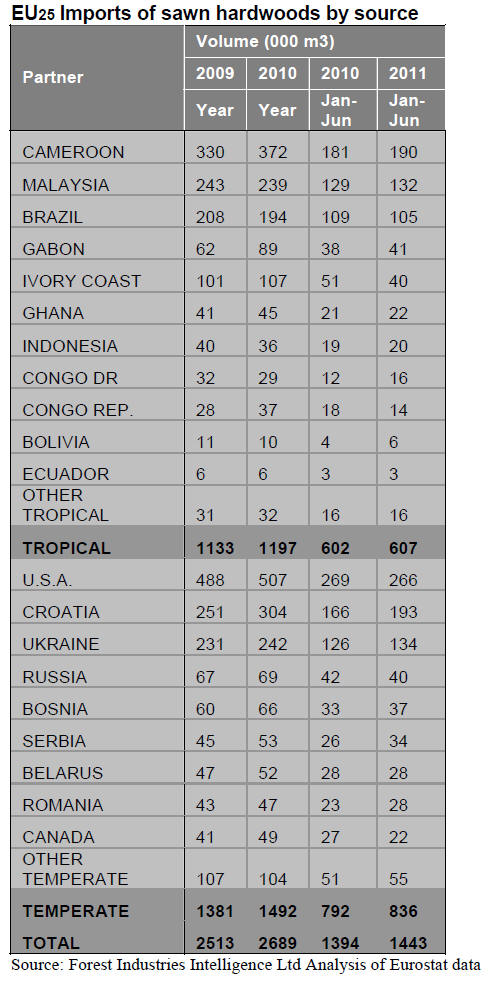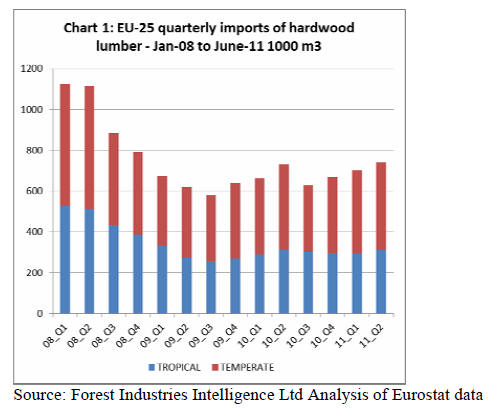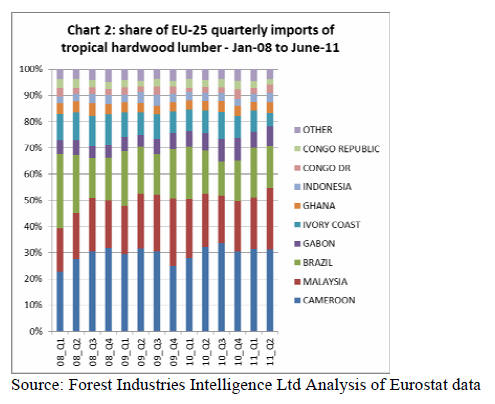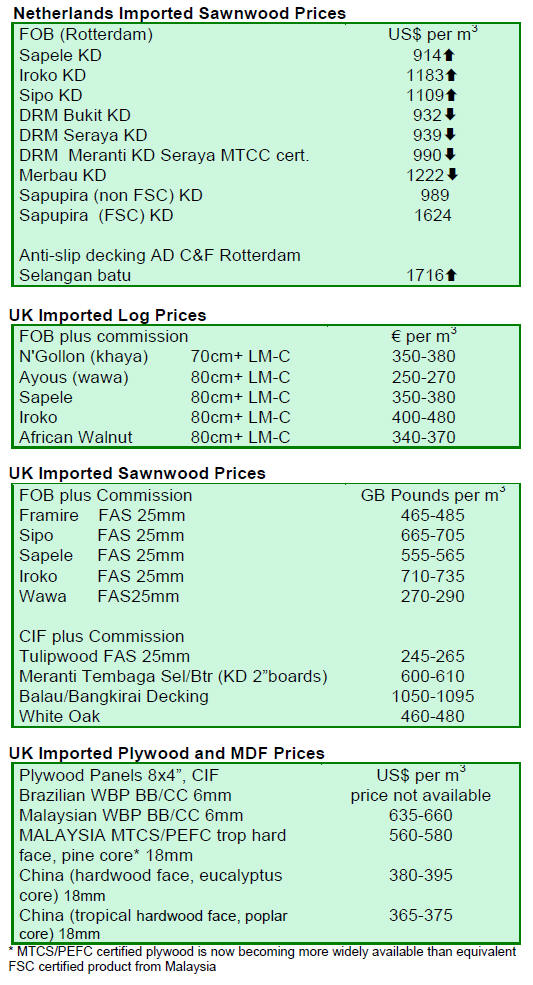|
Report
from
Europe
EU imports of tropical sawnwood main low but consistent
The following table shows imports of hardwood
sawnwood into the EU-25 group of countries from January
to June 2011.

Overall, imports are up only slightly compared to the same
period in 2010, with most of the growth in imports of
temperate hardwood, particularly from the countries of the
former Yugoslavia.
These countries are capable of supplying high quality oak,
a timber which has consolidated its hugely dominant
position in the European market this year.
During the first six months of 2011, EU imports of tropical
hardwood were very similar in volume terms and 5% up in
(euro) value terms compared to the same period the
previous year.
EU imports from Cameroon, Gabon, Ghana, the
Democratic Republic of Congo and Bolivia have
recovered quite robustly this year.
However these gains have been offset by a decline in
imports from Ivory Coast, Congo Republic and Brazil.
Imports from Malaysia have remained static compared to
the previous year.
The following graphic shows quarterly trends in EU
imports of hardwood sawnwood during the last 3 years.

Total hardwood sawnwood imports rose consistently in the
12 months before June 2011, although they still remain
well below levels prevailing before the economic crises.
Most of the gains over this period have been in temperate
hardwoods, of which quarterly imports increased from
327,000 m3 to 427,000 m3.
In the year to June 2011, tropical hardwood imports
remained flat at around 300,000 m3 each quarter.
Cameroon consolidates position as dominant supplier to the EU
How the share of different countries in total tropical
hardwood imports has varied since the start of 2008 is
shown in the following graphic.
Cameroon is now well established as the largest single
supplier of tropical sawnwood to Europe, consistently
contributing around 30% of all imports. Malaysia’s share
has been fluctuating but generally increasing and
consistently accounts for around 20% of EU tropical wood
supply.

Brazil’s share has been decreasing in the EU as more
wood is now being diverted to Brazil’s domestic market.
However, Brazil continues to account for around 15% of
total European tropical sawnwood supply and the country
remains an important supplier to the exterior decking
market.
Political problems have led to Ivory Coast progressively
losing share in the European market, from around 10% to
5% in the 12 months to June 2011.
Gabon’s share of the European tropical sawnwood market
has been rising and now stands at around 7% following
inward investment in wood processing and the country’s
ban on log exports.
Little prospects for any significant upturn in EU demand
Prospects for any significant improvement in European
demand for tropical wood during the last quarter of 2011
and in 2012 seem slim say analysts.
Demand for both African and South East Asian hardwood
sawnwood has barely picked up any pace since the
summer slowdown. Meanwhile economic uncertainty is
once again mounting across the continent.
The market for African sawn timber in Europe is
characterised by cautious buying for main commercial
species despite relatively low stocks for the time of year.
This is due to a combination of economic uncertainty,
continuing tight credit conditions, and nervousness about
long lead times when buyers are increasingly demanding
quick deliveries. Only a very limited number of importers
are in a position to speculate on the purchase of larger
volumes to hold in stock.
FOB prices for African sawn timber remain broadly stable,
with slow consumption balanced by limited supply.
However, market conditions vary according to species and
specification. There are reports of significant divergence
between markets for air dried and kiln dried African sapele
sawnwood in Europe.
While stocks air dried sawnwood is readily available on
the ground in Europe and prices are quite low, prices for
kiln dried are rising due to shortages of kiln space.
Meanwhile lead times for kiln dried material imported
from Africa are very lengthy.
UK importers report that framire/idigbo is now much
easier to source from Ivory Coast than earlier in the year.
However, most large UK importers are now less inclined
to purchase from Ivory Coast due to continuing difficulties
of obtaining credible documentation to demonstrate
legality at source.
This is becoming more of an issue as importers are
tightening up due diligence systems in preparation for
enforcement of the EU Timber Regulation from March
2013.
European landed stocks of iroko are reported to be quite
low at present. However there are also reports of
weakening prices for onward sales in Europe, implying
only slow consumption.
There is now relatively limited availability of sawn
sawnwood in the range of close-grained and fine-textured
timber species such as padouk, doussie , and bubinga
formerly cut in Europe from Gabonese logs.
FOB prices of sawn sawnwood for these species is now
around 20% up compared with the start of 2011.
European purchases of Indonesian bangkirai decking have
remained slow due to weakening of the euro against the
dollar and limited availability with strong demand in East
Asia and Australasia relatively firm prices.
These factors have encouraged more importers to look
again at Brazilian supplies of decking species such as
massaranduba and angelim pedra.
While Malaysian meranti sawnwood in popular European
specifications is available for immediate shipment,
demand has been so slack recently that some shippers have
eased prices in US dollar terms. However, this trend may
be short-lived as log prices are expected to rise again in
South East Asia.
Modified wood divides opinion
Long lead times for tropical hardwoods, combined with
the preference of stockists to work with low inventory
levels to reduce financial and perceived environmental
risks, continue to encourage some European importers to
search for substitutes to tropical hardwoods.
The European modified wood industry was out in force
again at the recent Timber Expo show in the UK, with
some major importers reporting their expectation to
gradually phase out tropical woods in favour of these
alternatives.
On the other hand, there are indications that the modified
wood industry has a way to go before this expectation is
realised.
At Timber Expo in Coventry there were a few specialist
importers willing to make the case for tropical wood over
modified wood.
One importer of hardwood decking said that modified
wood could not yet compete with the technical qualities of
the best tropical hardwoods. He suggested that poor
application of the thermal treatment process in particular
created a very dry product which would then absorb water
and discolour and degrade.
The UK’s TTJ also recently reported the difficulties
experienced by Indurite, a well-known modified wood
brand, to build market share in Europe.
Indurite noted that current modified wood prices mean that
it is still hard to find clients willing to switch away from
established products such as tropical hardwood coming
from South America. Prices for modified wood are tending
to rise on the back of increased energy and material costs.
Growing fears of double-dip recession in Europe
A recent poll of 70 economists by the news agency
Reuters suggests a growing chance the euro-zone economy
will slip back into recession as fears rise that the debt
crisis will escalate, financial markets slump further and a
global slowdown knock growth.
The poll undertaken in early October 2011 suggests a 40%
chance of a return to recession, up from a 30% in a poll
taken just a month earlier and a mere one-in-five in
August.
Reuters comment that “leading indicators point to weaker
economic conditions. Sentiment surveys have deteriorated
across key sectors of the euro zone economy, against a
backdrop of unusually high uncertainty and financial
market tensions,"
The Reuters poll aligns with the October 2011 Regional
Economic Outlook for Europe by the IMF which forecasts
that growth for all of Europe will slow from 2.3% in 2011
to 1.8% in 2012.
Economic indicators have weakened particularly
dramatically in Southern Europe, including in sectors of
considerable relevance to hardwood demand.
For example, the latest medium-term forecasts published
by the Italian construction industry association ANCE in
July 2011 suggest that construction sector investment will
decrease by 4% in 2011 (this compares to a decline of
2.4% forecast at the beginning of 2011).
Similarly, the latest data from the Spanish Government
office (Fomento) indicates that activity in Spain’s
devastated construction sector is sliding further into the
red. Planning approvals in the first seven months of 2011
(50,209) were 13% down on the same period in 2010.
A new report by ICD Research published in September
2011 concludes that growth in the Spanish construction
sector will remain extremely slow at around 1% per
annum at least until 2015.
However the economic news is not all bad. German
consumption figures have been good in recent months.
Building activity in Germany has risen well this year.
German furniture sector sales have also been increasing,
up 7.3% in the first half of 2011.
Interior door manufacturers are reporting brisk orders.
German flooring manufacturers are expecting sales growth
of between 5% and 15% for 2011 as a whole.
 Related News:
|